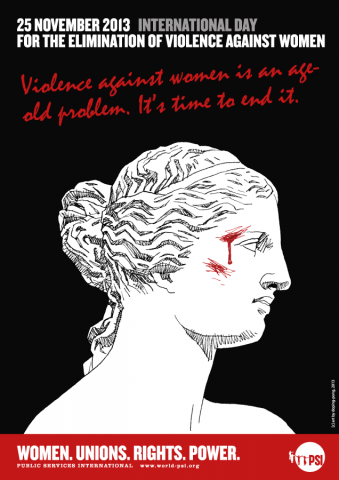 November 25 each year is the International Day for the Elimination of Violence Against Women or White Ribbon Day. The ASU, other unions and a large variety of organisations worldwide participate in awareness raising activities to promote the message because violence against women is not something we should keep a secret. By opening this tragedy up to the light, we have a greater chance of eliminating it.
November 25 each year is the International Day for the Elimination of Violence Against Women or White Ribbon Day. The ASU, other unions and a large variety of organisations worldwide participate in awareness raising activities to promote the message because violence against women is not something we should keep a secret. By opening this tragedy up to the light, we have a greater chance of eliminating it.
For many years, the ASU has been promoting the message of White Ribbon Day and encouraging people to speak up and be heard on this important issue. The Union has many White Ribbon Ambassadors across the country, including National Secretary David Smith and Assistant National Secretary Greg McLean. Our Branches participate in various ways around White Ribbon Day and throughout the year.
At the workplace level, the ASU has led the union movement in seeking and winning family violence leave in agreements, which provides assistance to victims of violence but also helps employers retain valuable staff through difficult personal periods. For more information, contact your local Branch.
Our international affiliates are also very active on this front and we reproduce the PSI news release about this issue below.
Resources
White Ribbon – Australian campaign website with numerous resources
Break The Circle! – campaign website produced by UNI Global Union (the ASU is also affiliated to UNI)
Violence against women is an age-old problem – it is time to end it now
By PSI (Public Services International)
You can read this on the PSI website here
The United Nations reports that 70% of women in the world are faced with some form of violence in their life and all too often they are blamed or punished themselves. Gender-based inequalities continue to deny women a say in the decisions that affect their lives. Domestic violence is the most prevalent form of violence that affects women, whereas forced marriages of young women and girls, rape and spousal killings are still meted out on women every day with impunity. Discrimination and hate crimes linked to sexual orientation are also prevalent around the globe.
 We have to note a worrying rise in terror campaigns against women trade union leaders, such as in Columbia and Guatemala. It is additionally shameful that the law on femicide in Guatemala is misused to target trade unionists. This means that a good law is not used to protect women, but to attack union activists and workers’ rights.
We have to note a worrying rise in terror campaigns against women trade union leaders, such as in Columbia and Guatemala. It is additionally shameful that the law on femicide in Guatemala is misused to target trade unionists. This means that a good law is not used to protect women, but to attack union activists and workers’ rights.
Violence at the workplace; be it sexual, physical or psychological happens everywhere – and must be stopped. “Public sector workers are well-placed to promote and enforce laws and rules that advance gender equality and protection against violence and harassment. Quality public services are often the only shield and support for women in this situation. Violence against women creates inequality, affecting the well-being of current and future generations. Violence and the threat of it deprive women of their basic human rights,” says Rosa Pavanelli, General Secretary of Public Services International.
Women’s rights are a central issue for the trade union movement, and connected to action on health, peace, human rights and sustainable development. In March 2013, the UN Commission on the Status of Women adopted agreed conclusions on the elimination and prevention of all forms of violence against women and girls, reaffirming the Beijing Declaration and other international instruments. Governments have made many commitments in the past that have not led to concrete results. Far too often, cultural, religious or political views are used to block gender equality. Urgent action is needed to strengthen and accelerate implementation, which is now too slow and uneven.
”Ending violence against women is a matter of life and death. It is not acceptable that everyday women around the world are beaten, raped and killed. Brutality and inequality must end. States must provide adequate measures to prevent violence and protect threatened women, prosecution, counselling and education to change the mentality of people. Shelters for abused women should be provided, and it is unacceptable that under austerity policies those services are abolished in many countries. We need strong commitments from states to end violence against women,” says Pavanelli.
PSI and our affiliates can work together and with civil society organisations to break the silence and mobilise against discrimination and violence in our workplaces and societies. This can include measures in collective agreements, pressuring governments to enforce laws provide the necessary resources to assist victims, and train judicial authorities and the police to deal adequately with issues of violence against women and girls. We also support initiatives such as the White Ribbon Campaign that focuses on prevention of violence through the education of men and boys and their involvement in the fight for gender equality.
We call on all PSI affiliate members, men and women, to make a pledge to end violence against women and girls, at each of their workplaces around the globe.
Violence against women is an age-old problem – it is time to end it now.

